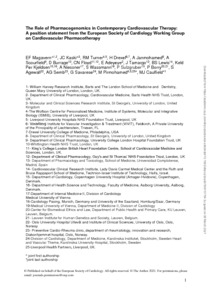Magavern, EF;
Kaski, JC;
Turner, RM;
Drexel, H;
Janmohamed, A;
Scourfield, A;
Burrage, D;
Floyd, CN;
Adeyeye, E;
Tamargo, J;
et al.
Magavern, EF; Kaski, JC; Turner, RM; Drexel, H; Janmohamed, A; Scourfield, A; Burrage, D; Floyd, CN; Adeyeye, E; Tamargo, J; Lewis, BS; Kjeldsen, KP; Niessner, A; Wassmann, S; Sulzgruber, P; Borry, P; Agewall, S; Semb, AG; Savarese, G; Pirmohamed, M; Caulfield, MJ
(2022)
The Role of Pharmacogenomics in Contemporary Cardiovascular Therapy: A position statement from the European Society of Cardiology Working Group on Cardiovascular Pharmacotherapy.
Eur Heart J Cardiovasc Pharmacother, 8 (1).
pp. 85-99.
ISSN 2055-6845
https://doi.org/10.1093/ehjcvp/pvab018
SGUL Authors: Janmohamed, Azara
![[img]](https://openaccess.sgul.ac.uk/113029/1.hassmallThumbnailVersion/pvab018.pdf)  Preview |
|
PDF
Accepted Version
Available under License ["licenses_description_publisher" not defined].
Download (1MB)
| Preview
|
Abstract
There is a strong and ever-growing body of evidence regarding the use of pharmacogenomics to inform cardiovascular pharmacology. However, there is no common position taken by international cardiovascular societies to unite diverse availability, interpretation and application of such data, nor is there recognition of the challenges of variation in clinical practice between countries within Europe. Aside from the considerable barriers to implementing pharmacogenomic testing and the complexities of clinically actioning results, there are differences in the availability of resources and expertise internationally within Europe. Diverse legal and ethical approaches to genomic testing and clinical therapeutic application also require serious thought. As direct-to-consumer genomic testing becomes more common, it can be anticipated that data may be brought in by patients themselves, which will require critical assessment by the clinical cardiovascular prescriber. In a modern, pluralistic and multi-ethnic Europe, self-identified race/ethnicity may not be concordant with genetically detected ancestry and thus may not accurately convey polymorphism prevalence. Given the broad relevance of pharmacogenomics to areas such as thrombosis and coagulation, interventional cardiology, heart failure, arrhythmias, clinical trials, and policy/regulatory activity within cardiovascular medicine, as well as to genomic and pharmacology subspecialists, this position statement attempts to address these issues at a wide-ranging level.
| Item Type: |
Article
|
| Additional Information: |
Correction available at https://doi.org/10.1093/ehjcvp/pvac038
This is a pre-copyedited, author-produced version of an article accepted for publication in European Heart Journal: Cardiovascular Pharmacotherapy following peer review. The version of record Emma Forton Magavern, Juan Carlos Kaski, Richard M Turner, Heinz Drexel, Azara Janmohamed, Andrew Scourfield, Daniel Burrage, Christopher N Floyd, Elizabeth Adeyeye, Juan Tamargo, Basil S Lewis, Keld Per Kjeldsen, Alexander Niessner, Sven Wassmann, Patrick Sulzgruber, Pascal Borry, Stefan Agewall, Anne Grete Semb, Gianluigi Savarese, Munir Pirmohamed, Mark J Caulfield, The role of pharmacogenomics in contemporary cardiovascular therapy: a position statement from the European Society of Cardiology Working Group on Cardiovascular Pharmacotherapy, European Heart Journal - Cardiovascular Pharmacotherapy, Volume 8, Issue 1, January 2022, Pages 85–99 is available online at: https://doi.org/10.1093/ehjcvp/pvab018 |
| SGUL Research Institute / Research Centre: |
Academic Structure > Institute of Medical, Biomedical and Allied Health Education (IMBE) |
| Journal or Publication Title: |
Eur Heart J Cardiovasc Pharmacother |
| ISSN: |
2055-6845 |
| Language: |
eng |
| Publisher License: |
Publisher's own licence |
| PubMed ID: |
33638977 |
| Dates: |
| Date |
Event |
| 2022-01 |
Published |
| 2021-02-26 |
Published Online |
| 2021-02-24 |
Accepted |
|
 |
Go to PubMed abstract |
| URI: |
https://openaccess.sgul.ac.uk/id/eprint/113029 |
| Publisher's version: |
https://doi.org/10.1093/ehjcvp/pvab018 |
Statistics
Item downloaded times since 08 Mar 2021.
Actions (login required)
 |
Edit Item |



